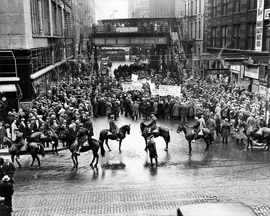Published: Saturday, February 2, 2008 at 4:30 a.m.
Herald Tribune
You can’t change history. But can you change the story?
That is what I have learned in researching a three-part series that continues tomorrow in the Sunday Real Estate section. “Florida Boom and Bust” focuses on the Florida land boom/bust in the 1920s, and draws a parallel to the current property market woes.
Using previously secret bank examination reports as his primary sources, attorney-historian-author Raymond Vickers wrote in his 1994 book “Panic in Paradise” that “fraud and insider abuse” on the part of bankers, developers and state banking regulators created a climate in which the boom could flourish. The bankers and developers siphoned off depositors’ funds for grandiose development schemes and their own personal use, he wrote, while manic speculators flocked to the state to feed at the trough of greed. When the market collapsed and banks started to fail in the summer of 1926, depositors were told by the state’s chief banking regulator at the time, Ernest Amos, that their money was safe. But Amos accepted unsecured personal loans from the bankers.
Who knew? Textbooks contain the time-honored story of Roaring ’20s speculation and profit-seeking that was derailed by shipping problems, hurricanes and the evaporation of buyer demand.
Historians I’ve interviewed taught me that this is common. David Whitten, a retired Auburn University history professor, offered some examples of historical myths with staying power.
“If you asked a fifth-grader who invented the sewing machine,” wrote Whitten in an e-mail, “he would, machine-like, say, ‘Elias Howe!’ I would say, Isaac Singer, because I know that Howe’s machine was an unreliable device, but Singer’s changed the way fabrics, leather, etc. are joined. By popular standards, the fifth-grader would be correct, and I would be wrong.
“We hosted a symposium on the 200th anniversary of the cotton gin in 1993. A substantial part of the … crowd argued that Eli Whitney did not invent the cotton gin. Nevertheless, the fifth-grader would say Eli Whitney was the inventor, and I don’t think that will ever be shaken.
“Did Watt invent the steam engine? The more a person knows about the steam engine, the less likely he’s is to say it was invented by Watt. But Watt will always get the credit.”
Will those unsavory bankers and developers of the 1920s ever get their credit?



